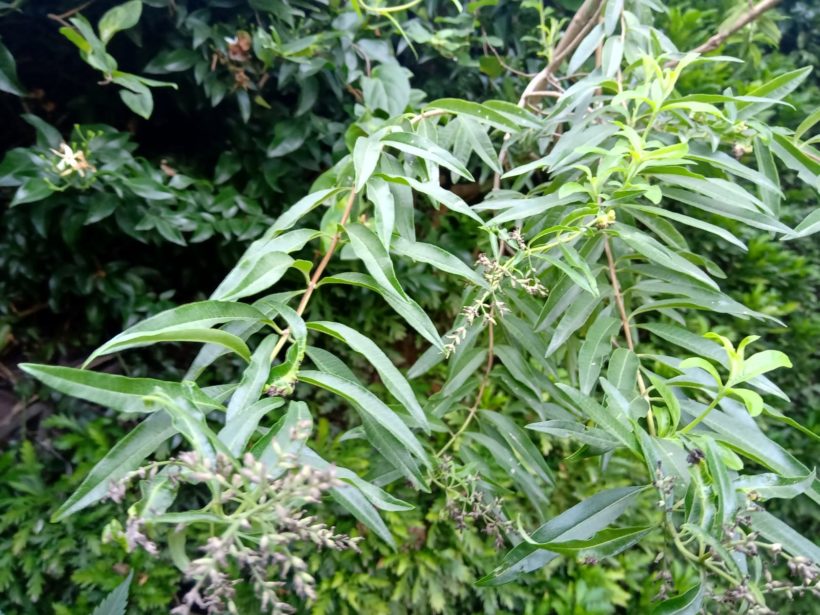The first thing that comes to mind is to comment on the birth of my relationship with this medicinal plant, it goes back to my childhood, coincidentally where the root of my vocation is affirmed. My grandparents, my childhood home, today a mental place full of infinite good memories. And these two extraordinary beings who were largely responsible for planting in me a purpose in life. The insurmountable value of ancestry, the value of the ancestral. This adds to each specimen that we choose a unique added value that we also want to share with you.
By Horacio Mesón
We will talk a little about the Cedron or Lemon verbena, whose scientific name is Aloysia citriodora. It is also known as lemon verbena, lemon verbena, princess verbena, saya saya and cidrinha. It is a shrub native to South America and is found in the wild in Argentina, Brazil, Paraguay and Uruguay. Nowadays its cultivation extends to the continents of Europe and Africa. It is domestic and adapts to any soil, withstands sun and rain. Warm climates favour it, but it also needs sun and humidity. It is cultivated for ornamental, medicinal and commercial purposes.
History of Cedron
According to chronicles, the discovery of the cedron in Argentina is located specifically in the high mountains of the provinces of Salta, La Rioja and Catamarca. During the 17th century, when the so-called conquistadors arrived in America, they immediately recognised that it was a very powerful plant with multiple uses. That is why they did not miss the opportunity to take several replicas of the plant to cultivate them in Europe and enjoy its benefits. It is worth mentioning that in European countries it has been able to survive in temperatures close to temperate climates.
The name Aloysia citradona, given by Antonio Palau, appears in one of his texts on botany entitled “Parte práctica de Botánica”, specifically in volume 1 of the edition published in 1784. This same author speaks of the cedron in the first place to pay tribute to the wife of Charles IV. The word citrodona is commonly used as a Latin derivative emphasising the scent of lemon.
Medicinal properties
It has antiseptic, anti-inflammatory, antipyretic, carminative and sedative properties. Thanks to its sedative properties it is beneficial for treating insomnia and nervous disorders such as anxiety. As an antispasmodic, it is used for colic pains of a biliary, renal, intestinal or menstrual type. It relaxes muscle fibres and thus reduces pain. Due to its carminative effect, it can be used as it favours the expulsion of gases. Useful in cases of dyspepsia, a feeling of heaviness after meals, bloating, frequent belching or constipation. It acts as a digestive tonic to aid digestion. For more information see: Doctor Hugo Golberg
The antioxidant properties of lemon verbena are ideal for fighting free radicals, reducing the risk of cell damage and significantly preventing ageing. It also helps to purify the body by eliminating unwanted waste and toxins. For rheumatism, the leaves, cooked and heated, are used on a cloth to be placed on the affected area to soothe and relieve pain.
Preparation of the infusion
The simplest and most appropriate way is to make an infusion from the dried leaves. Boil a litre of water and add a tablespoon of lemon verbena leaves. Let it steep for five minutes, strain and we recommend no more than two cups a day, preferably after meals.
Lemon verbena essential oil
The multiple benefits of the oil mean that it is considered a multi-purpose oil. Its compounds include geraniol, limonene, terpineol, myrcene, isovaleric acid, flavonoids and more. These elements make lemon verbena essential oil an antiseptic, antispasmodic, bactericidal, digestive, soothing compound, among many other properties. Like the infusion, this oil, when used correctly, can help reduce anxiety and promote relaxation. A bath with a few drops of essential oil is effective in combating the effects of stress and helps prevent anxiety or depression, as well as exhaustion and insomnia.
Another application of this oil is to treat asthmatic problems and nasal congestion. It can also be used to stimulate appetite and treat digestive disorders, help calm heart palpitations and strengthen the immune system. It can be used to heal skin wounds and prevent possible infections when used topically, as it has antiseptic properties, while at the same time reducing inflammation due to its anti-inflammatory properties.
Contraindications of Cedron essential oil
Do not use during pregnancy and lactation. Not recommended in cases of cystitis or diseases related to the urinary system. The use of Cedron is based more on experience over the centuries. Always consult a trusted professional.
Finally, something more than important that was not said: it is delicious with mate… unbeatable… (Mate is a very popular infusion in several Latin American countries).






